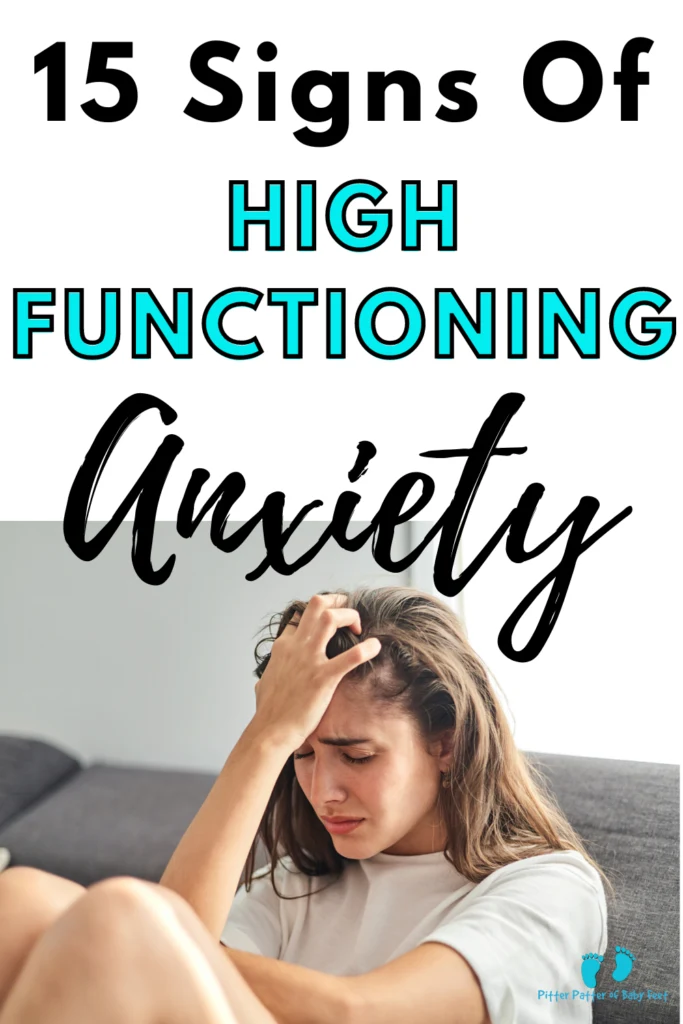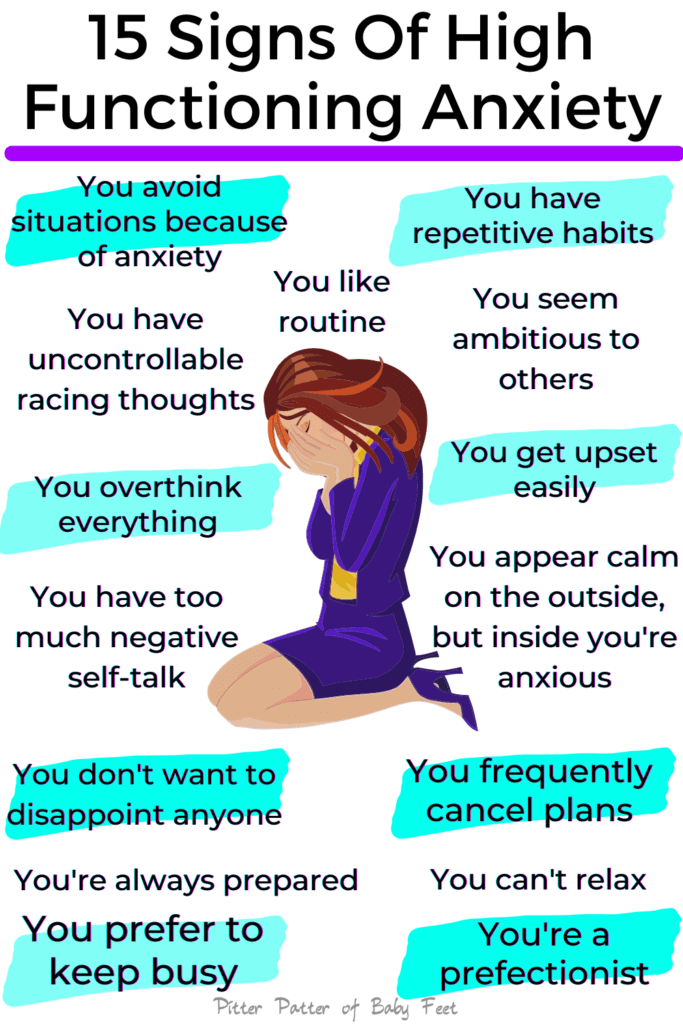High functioning anxiety is a relatively new term among the mental health community.
Although it is an anxiety disorder, it is not an official mental disorder recognized by the Diagnostic and Statistical Manual of Mental Disorders (DSM-V).
Each mental disorder doesn’t fit into a box. Individuals with the same diagnosis will exhibit different signs and symptoms.
But one way of seeing how well a person is coping with a mental disorder is to see if they are functioning normally in life.
Those who have anxiety may have high functioning anxiety if their disorder doesn’t interfere with their everyday life.
If you have anxiety, but are still able to function and fulfill life responsibilities you may have high functioning anxiety.
While you can function in life normally, it doesn’t mean anxiety doesn’t affect your everyday life!
Here’s how to identify if your anxiety is high functioning.
Disclosure: Bear in mind that some of the links in this post are affiliate links and if you click on them to make a purchase I will earn a commission. Keep in mind that I link these companies and their products because of their quality and not because of the commission I receive from your purchases. The decision is yours, and whether or not you decide to buy something is completely up to you.
What Is High Functioning Anxiety?
Many people identify with this term. But what’s the difference between anxiety and high functioning anxiety?
If you are diagnosed with anxiety but you’re still able to move forward in life with work and relationships, then you are experiencing a high functioning form of anxiety.
If your anxiety doesn’t allow you to complete obligations or you need to be hospitalized for symptoms, then it is not a high functioning form of anxiety.
Some people experience extreme anxiety in the form of panic attacks.
Panic attacks can cause someone to miss work and social engagements. Any form of anxiety interfering with your life is not high functioning.
Signs And Symptoms
You Prefer To Keep Busy
This type of busy is different than attending a ton of social events. Even though you may prefer to stay at home, you’re busier than ever.
Instead of keeping busy with social events you’re fulfilling a compulsion to complete tasks and stay on top of things.
Although you would love to just relax, there always seems to be too much on your to-do list. Countless tasks that need completing.
What’s worse is your anxiety keeps driving you to take on more tasks than you can handle and to complete them as soon as possible.
You’re Prepared
Being prepared is a great quality to have. But if you’re prepping yourself for the worst-case scenario when it comes to social situations or scenarios that haven’t occurred, this is a sign of high functioning anxiety.
Those with anxiety routinely play situations out in their head of what they will say and do.
Trying to prepare yourself for every possible outcome in life comes with a price!
First, your mind is obsessively working overtime to go over finite details that may never happen.
Two, it’s impossible to plan for any given situation in life.
Your anxiety is the one calling the shots of prepping for contingencies out of fear.
You Don’t Want To Disappoint Anyone
Expectations run high in today’s society. People with anxiety tend to hold high expectations for themselves.
This can be for many reasons, but some individuals feel a need to live up to other’s expectations.
The thought of disappointing other people may be a real fear.
If you disappoint someone it could lead to a fear of embarrassment or shame.
Related Articles: 27 Illustrations Of What Anxiety Feels Like
8 Lies Anxiety Wants You To Believe
9 Products For Anxiety And Stress Relief
You’re Outwardly Calm, But Inside You’re Anxious
By now you’ve probably mastered a poker face in public. Your facial expressions show little to no emotion when you encounter situations that make you anxious.
Some people may even think you are cold or distant. But that couldn’t be further from the truth.
Inside, you’re struggling to keep it together. You may even be afraid you will lose control of your emotions or feel panicky to the point that you want to run away entirely.
If you find yourself in a situation that gives you anxiety you face the possibility of trying to hold yourself together on the outside while inside you’re experiencing…
Racing thoughts, fast heartbeat, queasiness, ect.

You Avoid Situations That Make You Anxious
In order to not feel anxious, you’ve developed a habit of simply avoiding certain situations.
If large crowds make you anxious, you avoid them by not attending social functions with lots of people.
Although you’ve learned an easy way to tame your anxiety, you’re stopping yourself from living life to it’s full potential.
Friends may even become impatient with you canceling plans.
You Like Routine
Routine = Control
Some people crave change. They hate going to the same places and seeing the same people. You however are not one of those people.
Instead, you crave control. But why?
Because you can control your routine. That routine gives you a sense of control over your emotions.
Specifically, your anxiety that’s bubbling under the surface.
Stray from your routine and you lose your sense of security and control resulting in anxiety.
You Have Racing Thoughts You Can’t Stop
Racing thoughts are miserable! These are simply thought processes you cannot control and the thoughts are normally racing, meaning they are on repeat and they’re non-stop.
Basically your mind is working overtime trying to overanalyze and obsess over trivial details that won’t matter a year from now.
Individuals with high functioning anxiety have racing thoughts about past and future events.
For instance, you might still be thinking about your office meeting in which you didn’t contribute any new ideas.
However, this happened two weeks ago.
That’s what anxiety does. It tells you to worry about events that don’t matter down the road and overly criticize yourself.
Your mind is basically filled with a lot of negative self-talk and “what if’s.’.
On top of this, your mind is reliving these moments in order to prepare for future events similar to the ones you’ve experienced.
That way everything will be perfect.
You Get Upset Easily When Others Don’t
Some may call you “sensitive.” Things that normally don’t bother other people bother you.
Stressful things to you are not stressful to other people.
Therefore, friends and family often think you overreact about the little things in life.
When you spend your time avoiding certain situations and playing out scenarios in your head to calm your anxiety, you’re normally having low stress levels.
So, a minor problem that presents itself is able to upset you.
You Frequently Cancel Plans
To maintain low stress levels that minimize your anxiety, you cancel plans.
Although you have obligations like showing up for work, there are other areas of your life that you don’t show up for as diligently.
Doctors appointments. Dinner with friends. Any situation that raises your anxiety.
This leads to many instances of reschedule and rescheduling appointments again.
You Seem Ambitious To Others
This is a sign of high functioning anxiety that’s deceiving.
There’s no question about it… You’re driven in certain aspects of your life like work or a creative hobby.
However, just because your ambition shows itself with work related things doesn’t mean other areas of your life are not suffering as a result of anxiety.
Your drive or ambition is actually driven by your anxiety. It’s a complicated dynamic, but your need to be perfect.
Your desire for routine and your fear of disappointing others works itself into what looks like ambition.
Unfortunately, high functioning anxiety is the driving force behind it.
You Have Too Much Negative Self-Talk
Since you have racing thoughts and a replay of scenarios going through your head non-stop, it’s not surprising that negative self-talk is a consistent pattern in your thinking.
Negative self-talk is a way of thinking that develops with time. Think of it as a snowball effect.
One bad day causing negative self-talk progresses overtime to multiple days of negative thinking.
Now negative self-talk is becoming a habit. You can’t help but think negatively.
Examples of negative self-talk include:
~Calling yourself names
~Thinking of yourself in a negative light (“I’m such a failure”)
~Thinking you’ll have a bad day before your day even starts
You’re A Perfectionist
Just like a desire for a consistent and concise routine, you also need to be perfect.
Not just in one area of your life, but in all areas of your work and personal life.
The problem with wanting to be perfect in everything is that you’re setting yourself up for failure.
No one is perfect with everything in their lives. If you have high functioning anxiety, trying to be absolutely perfect is a need for control.
That perfectionism is just another way to control your anxiety.
Stray away from being perfect but a little and the negative self-talk of being a failure sets in leaving you in a full-blown panic mode.
You’ve Picked Up A Repetitive Habit
This doesn’t happen with all individuals with high functioning anxiety, but many do display one or multiple repetitive habits.
Repetitive habits are simply habits you unconsciously develop.
A repetitive habit may include nail biting, hair pulling, scalp scratching and more.
But why does someone develop a repetitive habit?
Nail biting and more repetitive behaviors are a way for your anxiety to show itself physically.
If your anxiety was lessened or controlled, the repetitive habit would likely disappear.
For now that repetitive habit is a way to get nervous energy out.
You Can’t Relax
With high functioning anxiety relaxation is a long-distance dream.
There’s too many worries to simply put time aside for relaxation. You don’t have to take a spa day or vacation to relax.
But even just reading a book to relax is basically nonexistent.
You mind won’t let you relax. Negative self-talk and racing thoughts take precedence over relaxation.
Because of the mental stress you’re under, you may also experience body aches and pains like tight shoulder muscles that won’t relax either.
You Overthink Situations
This goes hand-in-hand with racing thoughts and negative self-talk.
With high functioning anxiety something so little as the way you said hello to someone is over analyzed in your mind.
Your mind is on a vicious cycle of negative self-talk, racing thoughts, overthinking situations and repeat. Every day!
Something as simple as forgetting to say goodbye to your coworker now has you thinking she maybe upset with you and you could possibly lose her friendship.
Overthinking situations about things that haven’t come to pass and probably never will is another way for your mind to prepare in the future for a given event to reduce anxiety.
Final Thoughts
Do you have any other the above signs of high functioning anxiety? If you do you’re in good company.
Anxiety is one of the most common disorders in the United States making up 18% of mental disorders a year.
Even I fall into this 18% of the population!
Although many people exhibit the above signs, it doesn’t mean we don’t suffer any less on a day-to-day basis.
With anxiety you mind can seem out of control at times. You can’t control your worry and thoughts. Sometimes those worries are so bad they turn into panic.
There are also good days and bad days.
While you’re still dealing with anxiety well enough to complete everyday tasks and responsibilities, high functioning anxiety is no way to live. Some days I’d even compare it to torture!
If you’re having multiple signs of high functioning anxiety, now is the time to recognize the triggers to your anxiety and get help from a mental health professional.
Remember, there’s no shame in receiving help!
Help from a healthcare professional is not designated solely for those who can’t function in their everyday life.
With the help of a professional you can receive coping mechanisms to deal with high functioning anxiety.

Works Cited
What is functioning anxiety?
Characteristics of functioning anxiety
15 signs of an anxious introvert
The characteristics of functioning anxiety


